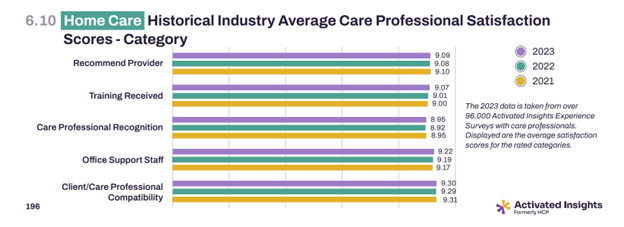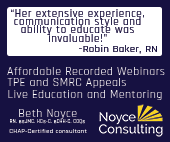This article is part one of a two-part series from Activated Insights, formerly Home Care Pulse. Come back next week for the continuing story. Read more about Caring for the Caregiver here.
by Todd Austin and Sasha Erickson
How to Create a Culture that Keeps Your Employees from Breaking Up with You
Healthcare employees admit that the 3 main factors contributing to the most stress at work are:
-
- Concerns about being trainied for the required workload
- Worries about job security
- Finding the time to balance work and personal life
As a result, almost 60% of those working in the healthcare space reported their self-assessed level of burnout to be between moderate and very high—which can be attributed to the high-level emotional investment required for the job.
Post-Acute Turnover
While the long-term and post-acute care is one of the fastest growing industries in the nation, it also ranks in the top 5 workforces with the highest turnover.
Fortunately, the care employee burnout crisis is fixable.
The cure?
Treating our staff, and ourselves, with a little more conscious compassion.
It's Not You, It's Me
The Long-Term Effects of Unappreciation
For most other industries, employee turnover peaks at one year.
But for the long-term and post-acute care industry, 40% of turnover occurs within an employee’s first 100 days.
Which isn’t leaving much room for providers to retain their staff. According to the 2024 Activated Insights Benchmarking Report, annual care staff turnover increased by 14% within the last two years, averaging a total of 79.2%.
But there is hope in the data.
What if we told you that simply thanking your care staff more could get them to stay longer than 3 months?
According to the Benchmarking Report, recognition received the lowest satisfaction score from employees. Care staff are most dissatisfied with the appreciation they’re receiving after a job well done, followed by feeling inadequately prepared for the field.

Not only are feelings of unappreciation causing turnover rates to skyrocket, it’s also having a detrimental impact on the state of the industry.
As a result of not feeling appreciated or recognized for the work they do, your employees may be showing warning signs of impaired grief processing:
-
- Irritability or anger
- oddly negative behaviors or attitudes that are uncharacteristic for the employee
- Obsessive thoughts
- rumination over certain patients or issues that is constantly brought up and seems to never be resolves
- Hyper alertness or overreactive behaviors
- intense, erratic behaviors or excessive attention to work that is unwarranted or outside of the normal response
- Self-harming behaviors
- gravitation to overworked, exhaustive behaviors e.g. refusing to take breaks, taking on added tasks unnecessarily
- Apathy or numbness
- lack of reaction to items that would normally cause a response, decrease in emotions, or refusal to address difficult emotions
- Irritability or anger
Contrary to popular opinion, an employee doesn’t leave their emotions at the door when they come into work. Especially if they work in a service-based industry like long-term and post-acute care.
The emotions an employee feels while caring on the job affects performance, customer and employee satisfaction, and care outcomes.
For example, if an employee is feeling stressed, frustrated, or disgruntled, they will either appear as they’re caring for their residents and patients or be forced to put up a positive front on the outside while bottling up negative emotions on the inside. Whether these types of negative emotions are revealed in the open or held within, either outcome leads to low satisfaction and high employee turnover.
Instead, be an advocate for your employees’ wellbeing and mental health. Provide resources for mental health support and regularly check-in with your staff at important milestones. Offering competitive benefits, flexible hours, and paid time off encourages employees to tend to their own needs as well as others.
# # #


As a highly accomplished executive, Todd Austin, COO & President of Activated Insights, is recognized as a leading voice in the rapidly-growing care industry. With over a decade of experience in executive leadership roles, Todd brings a wealth of knowledge and expertise to his current position as a key member of the Activated Insights team.
With a background in sales, marketing, management, operations, and finance, Todd is a true Renaissance executive with a rare combination of strategic and tactical skills. His expertise in developing and implementing growth strategies, optimizing operations, and driving profitability has made him a sought-after advisor to many organizations.
Sasha Erickson is the Director of Talent at Activated Insights, formerly HCP. With over 10 years of experience in human resources across a variety of industries, Sasha has worked with organizations ranging from small businesses to Fortune 500 companies. She graduated Summa Cum Laude from Utah State University with a degree in Business Administration and minors in Human Resource Management, Marketing, and Finance.
Sasha’s career history includes roles at Avant Guard Monitoring Centers, Goldman Sachs, Schreiber Foods, JBS and Pilgrim’s Pride Corporation, RR Donnelley, and Denver Public Schools. Her expertise spans talent acquisition, employee engagement, culture development, HCM software implementation, and strategic HR management.
©2024 by The Rowan Report, Peoria, AZ. All rights reserved. This article originally appeared in The Rowan Report. One copy may be printed for personal use: further reproduction by permission only. editor@therowanreport.com





